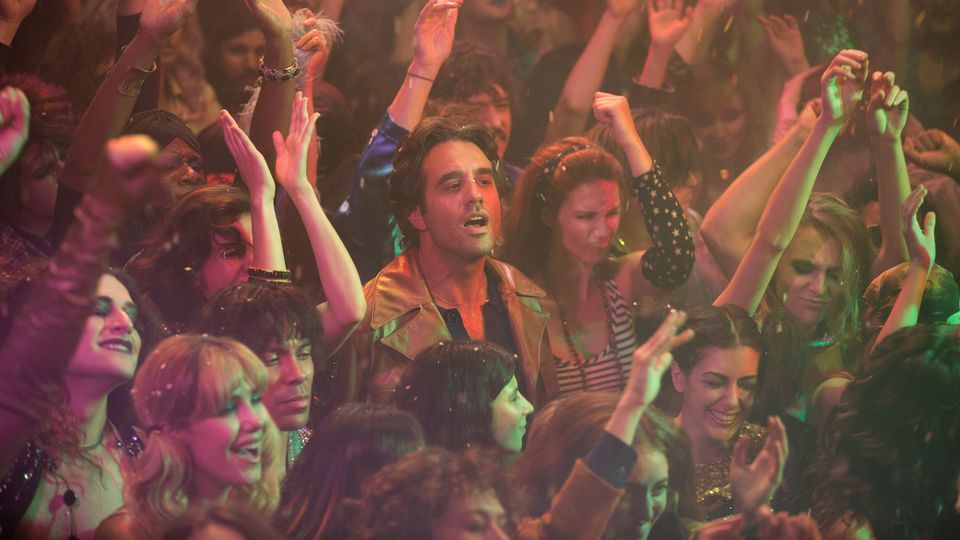FEBRUARY 17, 2016
In the film world, music and Martin Scorsese have become synonymous. I don’t think there’s another living director who has such astute musical taste, and some of Scorsese’s most memorable scenes involve his pairing of the perfect song with the perfect shot, enhancing the power of both. From Robert DeNiro’s star entrance, with a babe on each arm, to the Stones’ “Jumpin’ Jack Flash” in “Mean Streets,” to the glorious celebration of The Band in “The Last Waltz,” Scorsese’s mixture of music and imagery often unleashes a mixture of power and joy unparalleled by any other director.
There’s plenty of power in Scorsese’s latest project, the HBO musical drama series “Vinyl.” But there’s precious little joy.
“Vinyl,” which is executive produced by Scorsese, Mick Jagger, journalist Rich Cohen and Terence Winter (creator of “The Sopranos” and “Boardwalk Empire”), examines the New York music scene in 1973, as seen through the eyes of record executive Richie Finestra (Bobby Cannavale), who is trying to unload his troubled label, American Century Records, to the German corporation Polygram.
American Century is stuck with what Richie calls a “Chinese menu” of artists, from Donny Osmond to Robert Goulet to England Dan & John Ford Coley, thus earning the label’s nickname, American Cemetery Records. The soft rock craze is on its way out, and there’s no sign of The Next Big Thing ahead that could save the company, so without the Polygram deal, Richie, along with his right-hand man and payola master Zak Yankovich (Ray Romano) will be ruined. That, plus their raging drug habits. (It is kinda pop culture fun to see Ray Romano snort a line or two.)
The series is chock full of period detail (those clothes! that hair!), plus lots of period props (Princess phones, the brand new answering machine!), and it’s kind of a kick to see Manhattan of the 1970s recreated, from the now torn-down restaurants to the filth and graffiti in the subways. But it’s all surface.
Unlike the other record-label TV series on the air, Lee Daniels’ “Empire,” there’s no passion about music in “Vinyl.” Oh yes, the characters talk endlessly about their passion for music, but you never feel it coming from their bones. And no one at American Century seems to be having any fun, and that sense of joylessness is translated to the audience. After a while, it becomes a tired group of old boys smoking and snorting.
This is not to say that there aren’t women in “Vinyl,” but they’re the pretty familiar types from other male-ensemble shows. There’s Richie’s wife Devon (Olivia Wilde), who has had a past with Andy Warhol (interesting) but is upset that Richie often doesn’t make it home to Greenwich at night (not so interesting). And there’s the familiar secretary/aide, in this case A&R assistant Jamie Vine (Juno Temple), who is determined to show the bosses that she do the job as well as any man. Been there, done that.
“Vinyl” has its moments, usually involving director Scorsese’s visual flair. There are circular shots and tracking shots, including a homage to that “Mean Streets” bar shot that, in a flashback, reveals Richie’s first job as a bartender. Striking also are a number of still tableaux where the composition is so detailed that your eyes are doing all the moving around the frame. And there is a spectacular recreation of the 1973 collapse of the Mercer Arts Building that takes its time building the suspense until that final catastrophic moment.
The other main reason to see “Vinyl” is Bobby Cannavale. While he can be hilariously funny in film, Richie provides little opportunity for humor. Instead, it plays to Cannavale’s dramatic strength, creating sad and haunted men. He makes you feel every demon that is deviling Richie and make you care when he comes just that close to conquering them, but failing.
“Vinyl” is nothing if not ambitious, but, given the level of talent involved, I just wish that “Vinyl” was better. Much, much better.
GRADE: C












